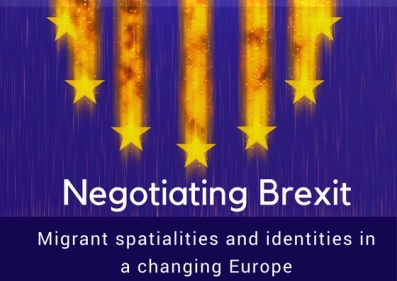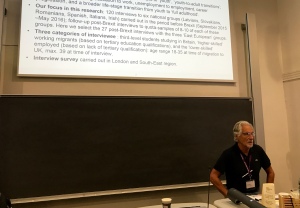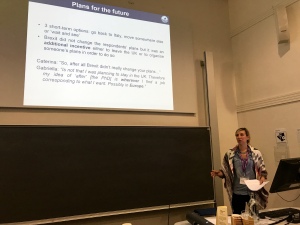Highlights from RGS-IBG
PGRG Blog #3, September 2017
 Negotiating Brexit: Migrant spatialities and identities in a changing Europe
Negotiating Brexit: Migrant spatialities and identities in a changing Europe
By Kate Botterill and David McCollum
Three sessions on ‘Negotiating Brexit’ at the 2017 RGS-IBG Annual Conference showcased emerging research on the impacts of Brexit on EU and non-EU nationals in the UK, British nationals in Europe and on established ethnic minority communities in Britain. These stimulating sessions highlighted the complexity of the debate around Brexit, pointing to diverse intersectionalities of experience along gendered, racialized and classed lines, between different generations of migrants and at different lifecourse stages.
Brexit transforming lives?
The transformative effect of ‘Brexit’ on people’s everyday lives was a key area of discussion. King, Lulle and Morosanu’s paper on the responses of London’s East Europeans to Brexit explored the tensions and ‘tactics’ of belonging involved in shaping future plans for mobility and settlement; Ranta and Nancheva showed how different ‘patterns of belonging’ after Brexit have affected ideas of EU citizenship; and Burrell’s paper on ‘secondary mobilities’ demonstrated how changes to budget airlines after Brexit may constrain both the material and embodied mobilities of EU nationals’.
Differential impacts and ongoing processes
Brexit was understood by many speakers as an ongoing, differentiated process with papers demonstrating that histories of marginality and privilege shape responses to and impacts of Brexit, along lines of nationality, gender, class, ethnicity and geography. This was explored from different positionalities and localities. McCarthy explored the differentiated reactions of Latin Americans with Spanish nationality and Spaniards living in the UK; Mazzilli and King drew out the experiences of young Italians living in ‘cosmopolitian’ cities like London and Brighton; Higgins and Walsh’s paper analysed the role of whiteness and class in articulations of Britishness abroad; Nativel explored the rational and pragmatic responses of Paris-based British nationals to living in Brexit ‘limbo’; while Botterill and Hancock argued that the referendum intensified already-existing insecurities among Polish nationals in Scotland and Guma and Jones highlighted that hostility targeted at EU migrants in pre- and post-Brexit rural Wales are part of ‘ongoing’ hostilities that have shaped EU nationals’ sense of belonging in particular locales.
Ageing and the lifecourse
Brexit raises specific challenges for younger and older people. Tyrell, Kelly, Sime, McMellon and Moksal highlighted the uncomfortable and ambiguous position of young Eastern Europeans in the UK positioned in between the category of ‘migrant’ and ‘citizen’; Jephcote, Williams, Janta and Li focused on youth identities and the variegated quality of life measures for different EU nationals; Prazeres and Findlay raised vital questions about the future of student mobilities and the agency of students and universities to contribute to policy on Brexit and international student mobility. Miller’s paper explored the changing meanings of home for retired ‘Brits abroad’ and the limited options for return migration while Majumdar argued that Brexit has intensified racial discrimination against established ethnic minorities thwarting the ‘final process of integration’ for Indian retirees in the UK leading to acute stress, homesickness, nostalgia and feelings of betrayal.
Further research for population geographers on Brexit
There is clearly scope for further research for population geographers as Brexit negotiations continue. Firstly, it will be important to think through how we might meaningfully and rigorously study ‘Brexit’ mobilities using mixed-method and participatory approaches to ‘de-colonise’ knowledge production and rethink the conceptual categories that underpin our research design. How do we talk meaningfully about mobility as a human process, rather than something ‘other’ people do? Can we find connections between different forms of mobility and Brexit, without resorting to over-determined categories of difference? What are the ethical challenges of migration research in the context of Brexit and European migration ‘crises’? Secondly, while Brexit has urged a conceptual re-think on national and transnational mobilities, belonging, racism, integration and citizenship, over-determination of the ‘event’ should be avoided. There are different ways to explore Brexit beyond the event, for instance through the lens of transition, or as a spatial and temporal process that shapes everyday life. Furthermore, the destabilising effect of Brexit also has potential to unsettle colonial conceptual frameworks and work towards more emancipatory and co-produced theory and praxis.
A full list of authors and paper abstracts from the sessions can be found here:
http://conference.rgs.org/AC2017/288
http://conference.rgs.org/AC2017/318
http://conference.rgs.org/AC2017/351
Blog post by Kate Botterill and David McCollum




